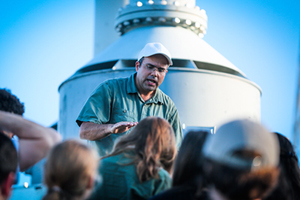Professor Richard Campanella, Geographer and Associate Dean for Research, Tulane School of Architecture

photo by Paula Burch-Celentano
Professor Richard Campanella is the author of 11 books and more than 220 articles on New Orleans-area geography, history, urbanism, and related topics. His research, which integrates mapping and spatial analyses with architecture, social science and the humanities, has been praised in the New York Review of Books, Journal of Southern History, Places Journal, Urban History, Louisiana History, Journal of the Abraham Lincoln Association, and Bloomsbury Review. The only two-time winner of the Louisiana Endowment for the Humanities Book of the Year Award, Professor Campanella has also received the Louisiana Literary Award, the Williams Prize for Louisiana History, the Malcolm Heard Award for Excellence in Teaching, the Hannah Arendt Prize for Scholarship in the Public Interest, the Tulane Honors Professor of the Year Award, and the Association of American Geographers' Media Achievement Award. In 2016, the Government of France named him as Chevalier dans l’Ordre des Palmes Académiques (Knight in the Order of the Academic Palms), and in 2019, the State of Louisiana awarded him the 20th annual Louisiana Writer Award.
What led you to your field?
What led me to geography, and specifically historical geography, was a love of “place,” a relishing of a sense of mystery (and figuring out mysteries), and a fascination with maps and spatial patterns.
How does what you do relate to historic preservation?
Historical geography relates fundamentally to historic preservation, in that the former seeks clues in the modern-day landscape and cityscape to decipher the past and understand the present, and the latter endeavors to save them and keep them relevant.
Why do you think historic preservation matters?
Go to any city. What are the most interesting areas? Go to any town or countryside. What buildings draw your attention? Visit any foreign country. What do you want to see the most? There’s your answer.
What courses do you recommend for students interested in this field?
Beyond courses in architecture and historic preservation, I would recommend a class in cultural geography, as well as in GIS (Geographic Information Systems, or computer mapping), which is a valuable skill in the marketplace.
Do you have a favorite preservation project? What about it made it special?

Being a researcher and writer, I don’t specifically work on restoring or renovating old buildings, but I do write about topics of interest to that community. For nine years, I’ve had a monthly piece in the Preservation Resource Center magazine Preservation in Print, titled “Streetscapes,” which are all archived at https://richcampanella.com/articles/
Can you tell us what you are working on right now?
I’m researching and writing a full-blown history of the dewatering of New Orleans—that is, municipal drainage, from the 1700s to the 2000s.
How do you think the national historic preservation programs help your community?
I can tell you how the local historic preservation movement has helped this community. Imagine New Orleans without the French Quarter. Can’t? Neither can I. Saving it was the work of early preservationists in the 1910s through 1930s.
Do you have advice for novice preservationists?
Become proficient in key technical skills. They will open doors for you.
The ACHP’s mission is “preserving America’s heritage;” can you give us an example of how your community is preserving its heritage?
New Orleans has some of the largest, most integral, and most contiguous urban National Register districts in the nation, and together they have preserved various histories and heritages, from architectural traditions, to ethnic settlement patterns, to walkable local commercial communities.
You've described your work as historical geography. Why is it important to you to include history, architecture, and other disciplines in tandem with geography?
Geography is that which inscribes character to place over the course of time (history). Architecture—and, more broadly, the built environment—is a major form that that “character” takes.
What is one unique feature that you've found about the history of New Orleans and the Gulf South?
How tenuous life can be on a fluvial delta.
Read more Q&A stories about the Preservationists in Your Neighborhood!